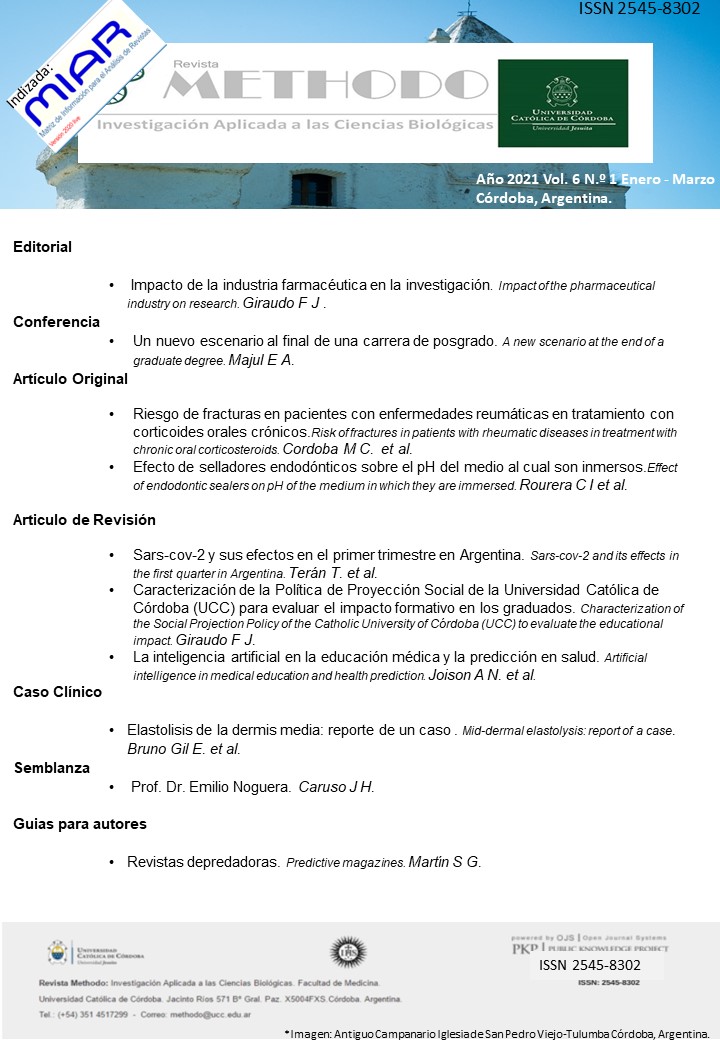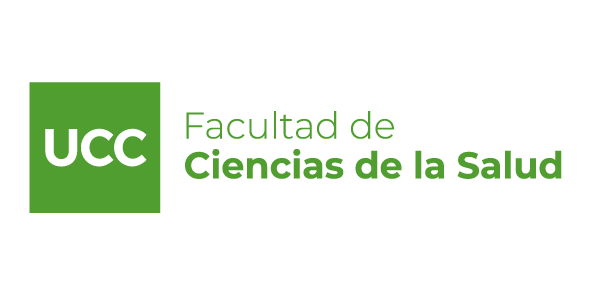La inteligencia artificial en la educación médica y la predicción en salud
DOI:
https://doi.org/10.22529/me.2021.6(1)07Palabras clave:
inteligencia artificial, cardiología, algoritmos, red neuronal, salud, predicción.Resumen
La inteligencia artificial tiene el potencial de transformar la forma en que se brinda la atención médica. Puede respaldar mejoras en los resultados y aumentar la productividad y la eficiencia de la prestación de los servicios. En servicios de las diferentes especialidades los avances realizados a nivel hardware deben desarrollarse en paralelo con los métodos de aprendizaje automático, aspectos que la inteligencia artificial contribuye para promover un cambio de paradigma significativo en las más diversas áreas de la medicina. Es importante en la educación médica como eje para el conocimiento y en la toma de decisiones que pueden mejorar el desempeño de los profesionales. Los estudiantes de medicina de nueva generación pueden adaptarse perfectamente a los nuevos métodos digitalizados en un contexto médico globalizado, incluida la inteligencia artificial. Por ello es importante tener como objetivos a implementar en los planes de estudio e introducir programas educativos representativos de esta tecnología. Es fundamental que todas las áreas del Sistema de Salud tengan confianza en los sistemas informáticos específicamente en el aprendizaje profundo, no solo por la información concreta y objetiva que de él se deriva sino también por la posibilidad de predecir eventos futuros, brindando alta certeza en cuanto al diagnóstico y tratamiento de enfermedades.Descargas
Referencias
Jiang F, Jiang Y, Zhi H, Dong Y, Li H, Ma S, et al. Artificial intelligence in healthcare: past, present and future. Stroke Vasc Neurol. 2017;2(4):230-43. https://doi.org/10.1136/svn-2017-000101
Abidi SSR, Abidi SR. Intelligent health data analytics: A convergence of artificial intelligence and big data. Healthc Manage Forum. 2019;32(4):178-82. https://doi.org/10.1177/0840470419846134
Asadi H, Dowling R, Yan B, Mitchell P. Machine learning for outcome prediction of acute ischemic stroke post intra-arterial therapy. PLoS One. 2014;9(2):e88225. https://doi.org/10.1371/journal.pone.0088225
Caliebe A, Leverkus F, Antes G, Krawczak M. Does big data require a methodological change in medical research? BMC Med Res Methodol. 2019;19(1):125. https://doi.org/10.1186/s12874-019-0774-0
Razzak MI, Imran M, Xu G. Big data analytics for preventive medicine. Neural Comput Appl. 2019;16:1-35.
Paranjape K, Schinkel M, Nannan Panday R, Car J, Nanayakkara P. Introducing Artificial Intelligence Training in Medical Education. JMIR Med Educ. 2019;5(2):e16048. https://doi.org/10.2196/16048
Yu KH, Beam AL, Kohane IS. Artificial intelligence in healthcare. Nat Biomed Eng. 2018;2(10):719-31. https://doi.org/10.1038/s41551-018-0305-z
Weaver SJ, Che XX, Petersen LA, Hysong SJ. Unpacking Care Coordination Through a Multiteam System Lens: A Conceptual Framework and Systematic Review. Med Care. 2018;56(3):247-59. https://doi.org/10.1097/MLR.0000000000000874
Elliott J, Stolee P, Boscart V, Giangregorio L, Heckman G. Coordinating care for older adults in primary care settings: understanding the current context. BMC Fam Pract. 2018;19(1):137. https://doi.org/10.1186/s12875-018-0821-7
Oh S, Kim JH, Choi SW, Lee HJ, Hong J, Kwon SH. Physician Confidence in Artificial Intelligence: An Online Mobile Survey. J Med Internet Res. 2019;21(3):e12422. https://doi.org/10.2196/12422
Dilsizian ME, Siegel EL. Machine Meets Biology: a Primer on Artificial Intelligence in Cardiology and Cardiac Imaging. Curr Cardiol Rep. 2018;20(12):139. https://doi.org/10.1007/s11886-018-1074-8
Chang AC. Artificial intelligence in pediatric cardiology and cardiac surgery: Irrational hype or paradigm shift? Ann Pediatr Cardiol. 2019;12(3):191-4. https://doi.org/10.4103/apc.APC_55_19
Johnson KW, Torres Soto J, Glicksberg BS, Shameer K, Miotto R, Ali M, et al. Artificial Intelligence in Cardiology. J Am Coll Cardiol. 2018;71(23):2668-79. https://doi.org/10.1016/j.jacc.2018.03.521
Price WN. Big data and black-box medical algorithms. Sci Transl Med. 2018;10(471). https://doi.org/10.1126/scitranslmed.aao5333
Paredes S, Rocha T, de Carvalho P, Henriques J, Morais J, Ferreira J. Integration of Different Risk Assessment Tools to Improve Stratification of Patients with Coronary Artery Disease. Med Biol Eng Comput. 2015;53(10):1069-83. https://doi.org/10.1007/s11517-015-1342-3
Al-Mallah MH, Elshawi R, Ahmed AM, Qureshi WT, Brawner CA, Blaha MJ, et al. Using Machine Learning to Define the Association between Cardiorespiratory Fitness and All-Cause Mortality (from the Henry Ford Exercise Testing Project). Am J Cardiol. 2017;120(11):2078-84. https://doi.org/10.1016/j.amjcard.2017.08.029
Smisek R, Hejc J, Ronzhina M, Nemcova A, Marsanova L, Kolarova J, et al. Multi-stage SVM approach for cardiac arrhythmias detection in short single-lead ECG recorded by a wearable device. Physiol Meas. 2018;39(9):094003. https://doi.org/10.1088/1361-6579/aad9e7
Stuckey TD, Gammon RS, Goswami R, Depta JP, Steuter JA, Meine FJ, 3rd, et al. Cardiac Phase Space Tomography: A novel method of assessing coronary artery disease utilizing machine learning. PLoS One. 2018;13(8):e0198603. https://doi.org/10.1371/journal.pone.0198603
Westcott RJ, Tcheng JE. Artificial Intelligence and Machine Learning in Cardiology. JACC Cardiovasc Interv. 2019;12(14):1312-4. https://doi.org/10.1016/j.jcin.2019.03.026
Rigla M, García-Sáez G, Pons B, Hernando ME. Artificial Intelligence Methodologies and Their Application to Diabetes. J Diabetes Sci Technol. 2018;12(2):303-10. https://doi.org/10.1177/1932296817710475
Kwon JM, Jeon KH, Kim HM, Kim MJ, Lim S, Kim KH, et al. Deep-learning-based out-ofhospital cardiac arrest prognostic system to predict clinical outcomes. Resuscitation. 2019;139:84-91. https://doi.org/10.1016/j.resuscitation.2019.04.007
Seymour CW, Kahn JM, Cooke CR, Watkins TR, Heckbert SR, Rea TD. Prediction of critical illness during out-of-hospital emergency care. Jama. 2010;304(7):747-54. https://doi.org/10.1001/jama.2010.1140
Smith GB, Prytherch DR, Meredith P, Schmidt PE, Featherstone PI. The ability of the National Early Warning Score (NEWS) to discriminate patients at risk of early cardiac arrest, unanticipated intensive care unit admission, and death. Resuscitation. 2013;84(4):465-70. https://doi.org/10.1016/j.resuscitation.2012.12.016
Otokiti A. Using informatics to improve healthcare quality. Int J Health Care Qual Assur. 2019;32(2):425-30. https://doi.org/10.1108/IJHCQA-03-2018-0062
Dawes TJW, de Marvao A, Shi W, Fletcher T, Watson GMJ, Wharton J, et al. Machine Learning Ventricular of Three-dimensional Right Motion Enables Outcome Prediction in Pulmonary Hypertension: A Cardiac MR Imaging Study. Radiology. 2017;283(2):381-90. https://doi.org/10.1148/radiol.2016161315
Yan Y, Zhang JW, Zang GY, Pu J. The primary use of artificial intelligence in cardiovascular diseases: what kind of potential role does artificial intelligence play in future medicine? J Geriatr Cardiol. 2019;16(8):585-91.
Ochodo EA, de Haan MC, Reitsma JB, Hooft L, Bossuyt PM, Leeflang MM. Overinterpretation and misreporting of diagnostic accuracy studies: evidence of "spin". Radiology. 2013;267(2):581-8. https://doi.org/10.1148/radiol.12120527
Chan KS, Zary N. Applications and Challenges of Implementing Artificial Intelligence in Medical Education: Integrative Review. JMIR Med Educ. 2019;5(1):e13930. https://doi.org/10.2196/13930
Han ER, Yeo S, Kim MJ, Lee YH, Park KH, Roh H. Medical education trends for future physicians in the era of advanced technology and artificial intelligence: an integrative review. BMC Med Educ. 2019;19(1):460. https://doi.org/10.1186/s12909-019-1891-5
Sit C, Srinivasan R, Amlani A, Muthuswamy K, Azam A, Monzon L, et al. Attitudes and perceptions of UK medical students towards artificial intelligence and radiology: a multicentre survey. Insights Imaging. 2020;11(1):14. https://doi.org/10.1186/s13244-019-0830-7
Gong B, Nugent JP, Guest W, Parker W, Chang PJ, Khosa F, et al. Influence of Artificial Intelligence on Canadian Medical Students' Preference for Radiology Specialty: ANational Survey Study. Acad Radiol. 2019;26(4):566-77. https://doi.org/10.1016/j.acra.2018.10.007
Pinto Dos Santos D, Giese D, Brodehl S, Chon SH, Staab W, Kleinert R, et al. Medical students' attitude towards artificial intelligence: a multicentre survey. Eur Radiol. 2019;29(4):1640-6. https://doi.org/10.1007/s00330-018-5601-1
Amisha, Malik P, Pathania M, Rathaur VK. Overview of artificial intelligence in medicine. J Family Med Prim Care. 2019;8(7):2328-31. https://doi.org/10.4103/jfmpc.jfmpc_440_19












